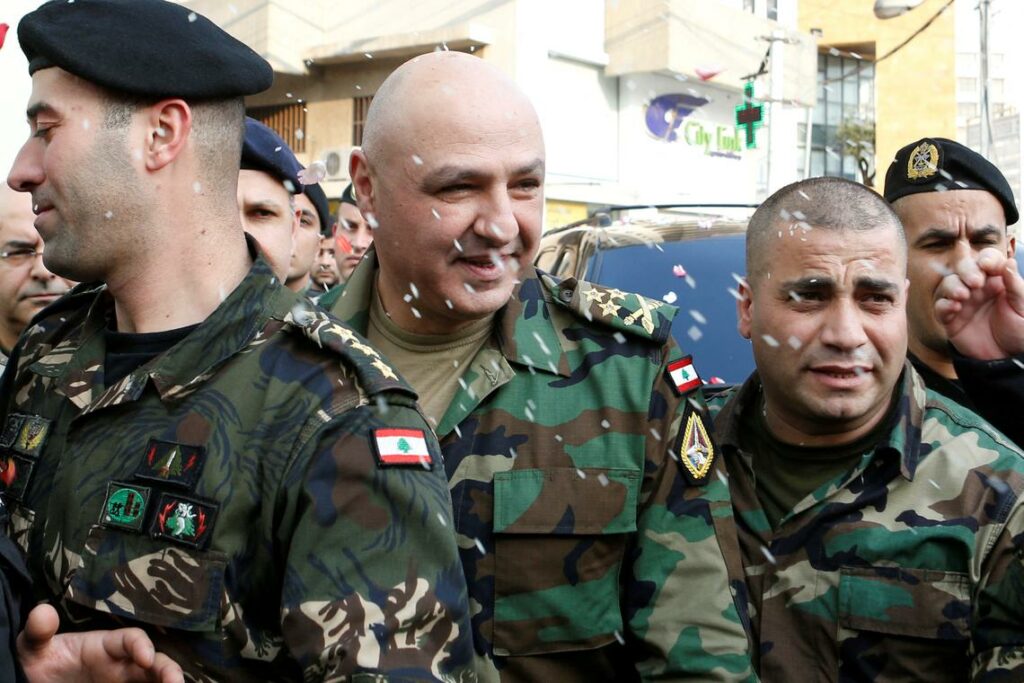(Reuters) – Lebanon’s parliament looks set to elect army chief Joseph Aoun head of state on Thursday, three senior political sources said, ending a presidential vacuum which has persisted since 2022 and showing the diminished sway of the Iran-backed Hezbollah.
The election marks the first test of Lebanon’s power balance since Shi’ite Muslim Hezbollah emerged badly pummelled from last year’swar with Israel, and since its Syrian ally Bashar al-Assad was toppled from power in December.
The post, reserved for a Maronite Christian in the country’s sectarian power-sharing system, has been vacant since Michel Aoun’s term ended in October 2022. None of the groups in the 128-seat parliament have enough seats to impose their choice, and they have so far been unable to agree on a consensus candidate.
Momentum built behind Joseph Aoun’s candidacy on Wednesday, as Hezbollah’s preferred candidate – Suleiman Frangieh – withdrew his candidacy and declared his support for the military commander, along with a growing number of other lawmakers.
While Hezbollah and its Shi’ite ally the Amal Movement led by Parliament Speaker Nabih Berri had long expressed reservations about Aoun’s candidacy as they stuck by Frangieh, the three sources said enough Shi’ite lawmakers would elect him in order to secure the 86 votes he needs to win.
One of the Lebanese politicians said Western and Arab contacts with Lebanese factions had intensified on Wednesday with the aim of securing the election of Aoun, who Lebanese political sources say enjoys U.S. approval.
French and Saudi envoys met Lebanese politicians in Beirut on Wednesday. Four Lebanese political sources who met the Saudi envoy, Prince Yazid bin Farhan, last week said he spelt out preferred qualifications which signal Saudi support for Aoun.
Saudi Arabia was once a big player in Lebanon, vying with Tehran for influence, before seeing its role eclipsed by Iran and the heavily armed Hezbollah, which is listed as a terrorist group by Washington and its Gulf Arab allies.
Aoun, 60, has been commander of the U.S.-backed Lebanese army since 2017. On his watch, U.S. aid continued to flow to the army, part of a long-standing U.S. policy focused on supporting state institutions to curb Hezbollah’s influence.
A candidate requires 86 votes to win in a first-round vote, or 65 in a second round. But Berri has said that Aoun, as a still-serving state employee, would still need 86 votes because his election requires a constitutional amendment.
George Adwan, a member of the Lebanese Forces party, a Christian faction which staunchly opposes Hezbollah and decided to vote for Aoun, said his election would “open the door to a new phase”.
MAJOR SHIFT
Aoun has a key role in shoring up the ceasefire brokered by Washington and Paris in November. The terms require the Lebanese military to deploy into south Lebanon as Israeli troops and Hezbollah withdraw forces.
Still reeling from a financial collapse in 2019, Lebanon desperately needs foreign aid to rebuild from the war.
Much of the damage is in Shi’ite majority areas.
Hezbollah, its supply line to Iran severed by Assad’s ousting, has urged Arab and international support for Lebanon.
The vote takes place against a backdrop of historic change in the wider Middle East, where the Assad-led Syrian state exercised sway over Lebanon for decades, both directly and through allies such as Hezbollah.
Hezbollah’s support was vital to propelling Michel Aoun to the presidency in 2016, as the group and factions which supported its possession of a powerful arsenal were in the ascendant.
A State Department spokesperson said it was “up to Lebanon to choose its next president, not the United States or any external actor”.
“We have been consistent in our efforts to press Lebanon to elect a new president, which we see as important to strengthening Lebanon’s political institutions,” the spokesperson said.
Saudi Minister Faisal bin Farhan said last October that Riyadh had never fully disengaged from Lebanon and that outside countries should not tell Lebanese what to do.
French Foreign Minister Jean-Noel Barrot expressed hope in comments to France Inter radio, saying the election was “a prerequisite for the continuation of this dynamic of peace” and also for Lebanon’s economic and social recovery.
Other candidates in focus include Jihad Azour, a senior International Monetary Fund official who formerly served as finance minister, and Major-General Elias al-Baysari – head of General Security, a state security agency.

